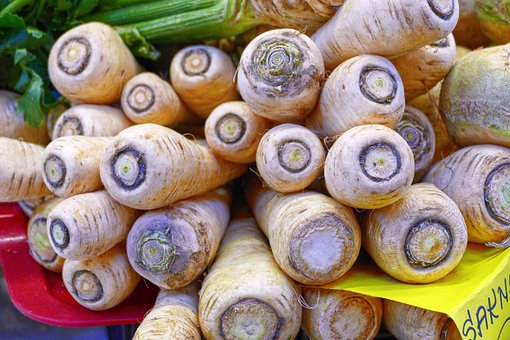Parsnips are a root vegetable that are closely related to carrots and have a similar appearance, but are pale in color and have a sweet, nutty flavor. They are a good source of several nutrients and have been shown to have several potential health benefits.
One cup (150 grams) of cooked parsnips contains approximately:
134 calories
30 grams of carbohydrates
3 grams of protein
0 grams of fat
7 grams of fiber
Parsnips are a good source of several vitamins and minerals, including:
Vitamin C: Parsnips are a good source of vitamin C, which is an essential nutrient that helps to maintain a healthy immune system. It also helps to promote healthy skin and helps to protect the body from free radical damage.
Folate: Folate, also known as vitamin B9, is important for the proper development of the brain and nervous system. It is also necessary for the production of DNA and RNA, the body’s genetic material.
Potassium: Potassium is an important electrolyte that helps to regulate heart function and maintain healthy blood pressure levels. It also helps to maintain proper fluid balance in the body and is necessary for muscle function.
Manganese: Manganese is a trace mineral that is necessary for the proper functioning of the enzyme system in the body. It is also necessary for the metabolism of carbohydrates, amino acids, and cholesterol.
Parsnips also contain a small amount of several other nutrients, including calcium, iron, and zinc.
In addition to the nutrients listed above, parsnips also contain several plant compounds that may have potential health benefits. These include:
Polyacetylenes: Polyacetylenes are a class of compounds found in parsnips that have been shown to have antioxidant and anti-inflammatory effects. They may also have the potential to help protect against cancer.
Flavonoids: Flavonoids are a type of plant compound that have been shown to have antioxidant and anti-inflammatory effects. They may also help to protect against heart disease and certain types of cancer.
Parsnips are a low-fat, low-calorie food that is high in fiber, which makes them a good choice for people who are trying to lose weight or maintain a healthy weight. The high fiber content of parsnips can also help to promote bowel regularity and may help to reduce the risk of constipation.
Parsnips are a good source of complex carbohydrates, which are an important source of energy for the body. They are also a good source of natural sugars, which can help to satisfy a sweet tooth without the added calories and sugar of processed sweets.
In addition to the nutrients and plant compounds listed above, parsnips may also have several other potential health benefits. Some studies have suggested that parsnips may have the potential to:
Lower blood pressure: The high potassium content of parsnips may help to lower blood pressure levels, which can reduce the risk of heart disease and stroke.
Improve blood sugar control: The high fiber and low glycemic index of parsnips may help to improve blood sugar control, which can be beneficial for people with diabetes or at risk for developing diabetes.
Promote bone health: The high levels of vitamin K and manganese in parsnips may help to promote bone health and reduce the risk of osteoporosis.
Boost immune function: The high levels of vitamin C in parsnips may help to boost immune function and protect against infections.

 Home
Home Health
Health Diet & Nutrition
Diet & Nutrition Living Well
Living Well More
More












